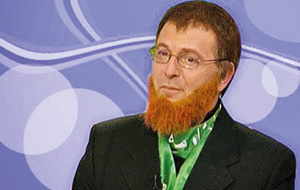
Tal Friedman is one of the few comic geniuses in the Jewish state (ok, I’m not being entirely objective here). He was best known for his regular appearances on the popular weekend satirical show “Eretz Nehederet” (Wonderful Country). From his sidesplitting portrayal of Luba, the easily annoyed checkout lady with the heavy Russian accent, to his dead-on portrayal of Mohammed Abu Tir (with his trademark red, henna-tinted beard), Friedman just knows how to tickle the funny bone.
Well, as his name seems to imply, he is a scion of an Eastern European Jewish family that immigrated to Israel from Poland. But Friedman wasn’t always so sure. In a recent Israeli version of the popular genealogical show “Who Do You Think You Are?,” he recounted an old family tradition wherein the clan was supposed to have originated in either Spain or North Africa owing to the family surname, Kartagener. The name was thought to have been taken on by an ancestor who came from either Cartagena, Spain, or from Tunisia (Carthage is now a suburb of modern-day Tunis, Tunisia. Its Spanish namesake was dubbed so by the conquering Carthaginian King Hasdrubaal in 227 BCE).
Friedman starts his journey by undergoing a DNA test. He follows it up by traveling to Poland and meeting a second-cousin there. The latter is skeptical, at best, about the purported Spanish or North African claims. The DNA results come back and show that he has the typical Eastern European Ashkenazi haplotype.
So, the question remains for us researchers and novices; from whence this curious surname? Kretinga in Lithuania has been proposed as a possible source (although I am skeptical owing to the spelling of the respective names).
The surname seems to have been adopted randomly. Similar place names were adopted by Eastern European Jews when the taking of a surname became mandatory in the first part of the 19th century. In order to meet the demand of developing numerous varied surnames, either the Jewish administration or their bearers often invented surnames based on precious metal and gems, colors, types of flora, minerals, animals and even countries.
Here are several examples:
Gibraltar is a rare Jewish surname. Its origin is not particularly unique and does not indicate, as many laymen theorize, that its bearers descend from Sephardic Jews once residing on the island of Gibraltar. Surnames based on countries among Jews in Czarist Russia include Amerikaner (i.e., America), Denemark, England, Fin (i.e., Finland), Irlender (i.e., Ireland), Maroko (i.e., Morocco), Meksik (i.e., Mexico), Shvaytser (i.e., Switzerland), Shveyd (i.e., Sweden), Suria (i.e., Syria), Yapontchik (i.e., Japan), and Yordansky (i.e. the Jordan River). In no way do these surnames indicate that these Jewish families originated from any of these countries, for certainly no Jews ever immigrated to Russia prior to 1821 from a number of these countries. Jews did not reside in modern times in Japan until 1861, and no Jews were allowed to reside in Finland until the 1850s. Hence, when the Jews in the province of Suwalki were required to acquire surnames in 1821, the surname Gibraltar was generated among thousands of new surnames.
It is quite common for families to have a tradition of Sephardic descent based on garbled traditions or erroneous information. For instance, people would recall an ancestor who practiced “sfard” traditions, which in reality points to chasidic customs. Other times a family surname may sound similar to a Sephardic name but it isn’t related at all. The last example can be found in the Hungarian-Jewish surname Prera; while it has a phonetic resemblance to the famed Sephardic surname of Perera (Pereira and other variations), it is in fact based on a toponym, Prerov in Bohemia (today Czech Republic). See https://www.geni.com/people/Chaim-Brach-Prero/5433744684240101739
Ceterum censeo Carthaginem esse delendam (I kid).
The author runs Channeling Jewish History and is available for speaking engagements. Please contact him at [email protected].













